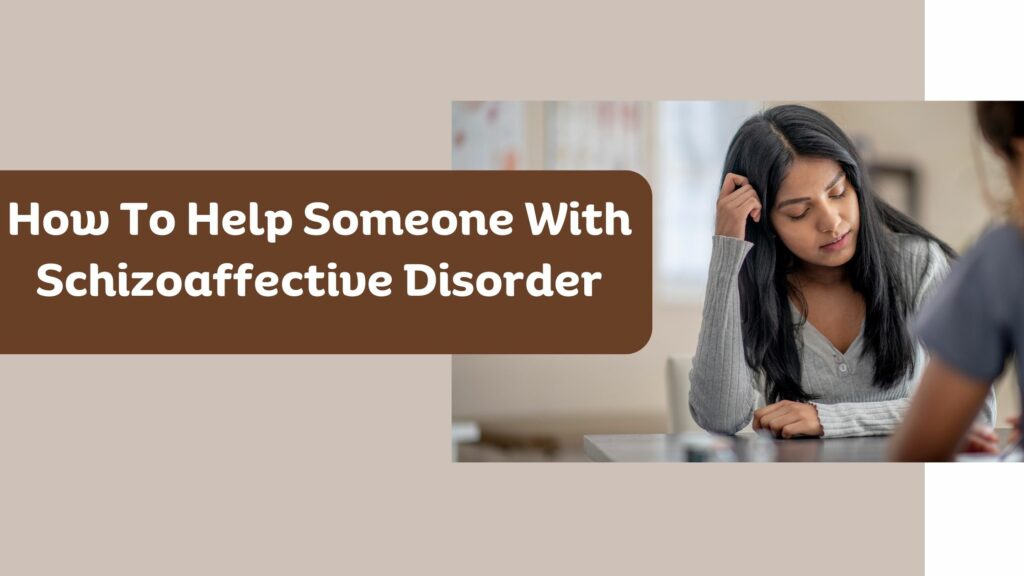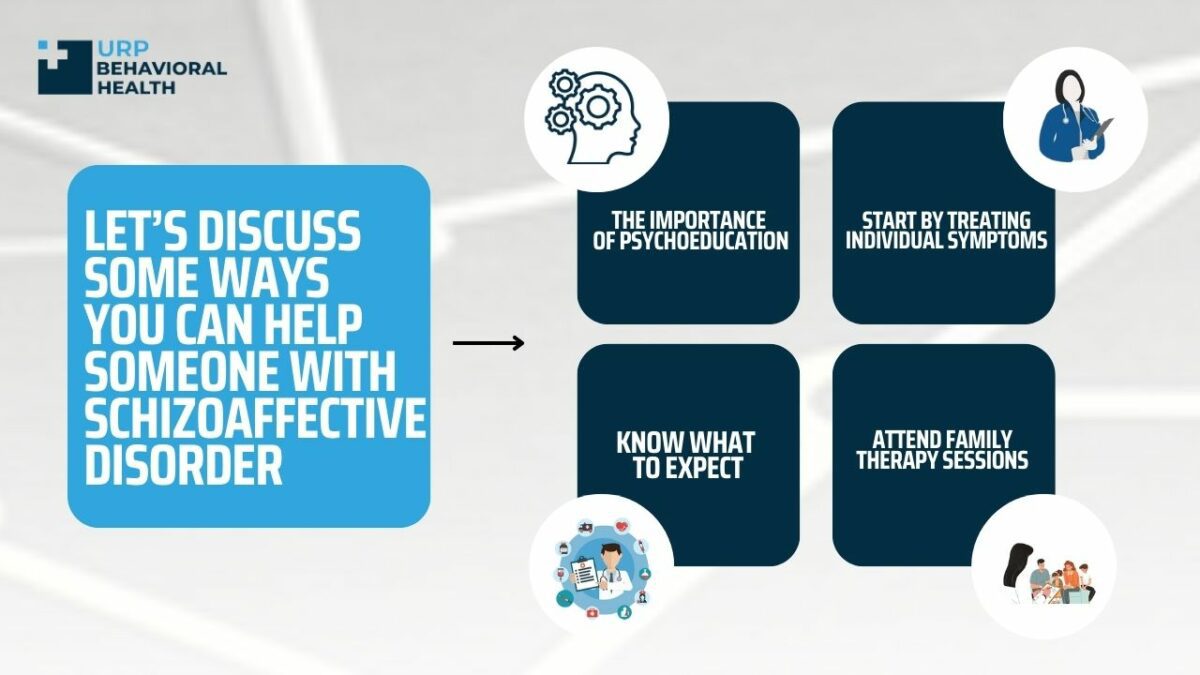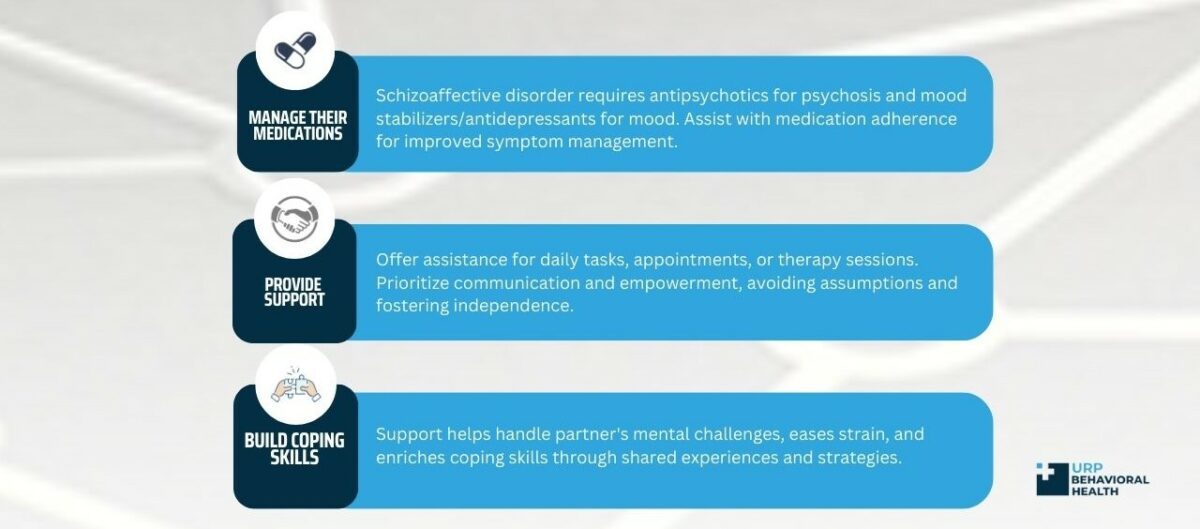How To Help Someone With Schizoaffective Disorder

Schizoaffective disorder is a condition that can cause severe problems in communication and functioning. And despite being rare, it still significantly affects people who develop the condition and their loved ones. Having a loved one who struggles with a psychotic disorder can be challenging. Therefore, family members often need guidance from professionals on how to best support a loved one.
At URP Behavioral Health, we emphasize providing the highest quality of care. At the same time, we believe that family support greatly impacts how long a person retains the benefits of treatment. Our interdisciplinary team of medical and mental health professionals guides you on how to best support a loved one with schizoaffective disorder. How to support someone with schizoaffective disorder? Let’s discuss some ways you can.


1. The Importance of Psychoeducation
When you have a loved one who’s struggling with a condition like schizoaffective disorder, the first thing you can do is learn about it. Psychoeducation is a major component of any effective inpatient treatment program. A review of 20 studies shows that psychoeducation can increase adherence to the treatment plan and reduce the risk of relapse. It proves that understanding a condition can promote recovery.
Similarly, research shows that family-based psychoeducational interventions can improve social and occupational functioning. When you understand why a loved one is behaving a certain way, it encourages you to respond in a more compassionate and supportive way.
2. Start By Treating Individual Symptoms
If you suspect that a loved one has schizoaffective disorder and you’re trying to convince them to seek treatment, it’ll be quite a challenge. It’s common for people on the schizophrenic spectrum to avoid seeking care because they fear that it makes them seem ‘crazy.’ In this situation, you can encourage them to seek help for a specific symptom rather than the entire disorder.
For example, if they’re having difficulty sleeping or focusing, you can suggest that they see a professional for those issues. With time, they’ll feel more open to seeking help for schizoaffective disorder.
3. Know What To Expect
Having hope when a loved one has schizoaffective disorder can keep you and your family strong. Even so, you need to have reasonable expectations about the challenges you’ll face. There’s no cure for schizoaffective disorder, or any other psychotic disorder, for that matter. However, you can still help them manage symptoms and build better coping skills. Setting realistic expectations about treatment will motivate you and help you stay patient during the recovery process.
4. Attend Family Therapy Sessions
Family therapy is a critical aspect of inpatient treatment because it facilitates communication and bonding between family members. More importantly, it provides everyone with a safe space to discuss the challenges they face in living with someone who has schizoaffective disorder.
These sessions also provide you with an opportunity to learn about the therapeutic process. The therapist will guide you on how to address certain challenges that occur when a loved one has a psychotic disorder.

5. Manage Their Medications
Because schizoaffective disorder includes psychotic symptoms and a major mood episode, there’s a need for medication to address both components. Therefore, people with the condition need to take antipsychotic drugs to tackle symptoms such as hallucinations, delusions, and negative symptoms. And to manage mood disturbances, they may be prescribed an antidepressant or mood stabilizer, depending on the type of schizoaffective disorder they have.
When they’re taking different medications, you can help them by managing their doses and making sure that they take them on time. Sticking to a medication schedule can increase the drug’s efficacy, allowing your loved one to manage symptoms better.
6. Provide Support
When a person is struggling with psychotic symptoms and mood disturbances, even the simplest of activities can become a challenge. In these situations, you can step up and provide support by asking if they need any help. Maybe they need some help with housework or scheduling appointments, or they need someone to give them a ride to their weekly therapy session.
There are a number of ways that you can be more supportive and help them get the care they need. The important thing is to listen and ask instead of assuming on their behalf. You want to encourage self-help instead of making your loved one feel like they can’t do anything on their own.
7. Build Coping Skills
Living with someone who struggles with psychotic symptoms and mood fluctuations is difficult. It can put a strain on your relationship and take a toll on your ability to communicate. Having a strong support network can give you the strength and motivation to cope with these challenges. It also gives you the opportunity to learn about how others deal with similar situations. As you implement different strategies, you learn to cope with stressful situations as they arise.
FAQs
Let’s have a look at some commonly asked questions regarding schizoaffective disorder:
Schizoaffective disorder is characterized by the occurrence of a major mood episode in the presence of schizophrenic symptoms, i.e., psychotic features. The mood disturbance could be in the form of a depressive or manic episode, depending on the type of schizoaffective disorder you have.
No, schizoaffective disorder isn’t the same thing as schizophrenia. It does share the same psychotic symptoms, but it also includes a mood component in the form of a major mood episode.
At URP Behavioral Health, we conduct a medical assessment and psychiatric evaluation to determine the condition of your physical and mental health. This helps rule out the possibility that your symptoms are the result of taking a substance or another health condition. Then, your symptoms are compared against the criteria provided in the APA’s DSM-5 and WHO’s ICD-11.
Let us guide you towards healing
We know that seeking treatment can be overwhelming, but our staff is here to make the process as smooth as possible. We’re available 24/7 to address any questions or concerns you may have.

